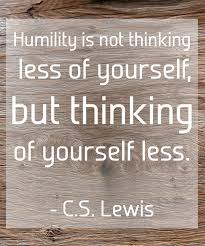"Blessed are the meek for they shall inherit the earth."--Jesus"You're blessed when you're content with just who you are--no more, no less. That's the moment you find yourselves proud owners of everything that can't be bought"--Jesus in Matthew5:5, The Message Meek? There is not much place for meekness in today’s world filled with clinching teeth, competitive grips and running and living on empty. I’m not even sure many of us have the word “meek” in our everyday vocabulary. Fewer still, seek to live with meekness as one of their most wanted characteristics. We want to be thin, smart, important, wealthy and successful. But who really wants to be meek? We train for our roles in life but we do not train to develop characteristics such as being meek.Yet, Jesus again, smears clean our programmed ways to be happy by telling us that meekness is where the action is. Somewhere along life’s way, we have to stop and look in the mirror for mirrors rarely lie. When we look at ourselves and our inner world—and see if the speed in which we are living; our busyness and our successes are really working for us? Meekness is really an invitation to live another way—perhaps a whole other way. To live the life we secretly long for, we need to have our old programs for “”how to be happy” stripped. We need a new way to live. This is precisely what Jesus does in the Beatitudes. These short statements are all invitations to live well and live with a better goal in mind.But what does meekness look like, smell like and feel like in a world where power, control and dominance are our unholy trinity we live with in our daily lives?Becoming meek is becoming who you really are without the façade of power, position and influence.You’ve noticed I’m sure, like I have, how people seek to impress us with their status. Becoming meek is letting go of all self-aggrandizing statements which tout, “I’m the leader in my field.” “I won this award.” “I have 5,000 followers on social media, so I am really someone important.” You lay down your efforts to say you are the best; have the answer or know the precise answer to almost any question posed to you. Meekness restrains self-promotion.Cultivating meekness is a necessary movement in how you posture yourself at home, at work; at church and by yourself. The world, work and even the church can call out the worst in us, not the best. We play charades. We become people we are not. We live as if the outside is what matters—it becomes, perhaps, all that matters. We re-enforce the false self and wear lots of armor to hide what is really inside. Meekness flushes out what is inside and holds it as honorable, true and right. [tweetthis]To cultivate meekness is to live in a vulnerable posture--exposing your true self and living out of the core of your true self without polish, edits and apologies.[/tweetthis]Meekness is living from the inside and moving towards the outside. It is recognizing your self-worth in God’s eyes—if no one else’s. It is living from a place of inner-peace and calm and moving away from the clanging of cymbals; the buzzers of busyness and the marching cadence which says, “Do something to be someone special.” Being meek is giving up the illusions that we have to impress someone—even God by our doings and our appearances.We live in an assertive world driven by extroverts in our churches and work spaces that make us become “high capacity” machines. Meekness chooses to listen to a different, Greater Voice, which says, “Stop masquerading. Live from your core. Move towards redeeming your false self and let go of hauling all your tips and techniques by the side of the road.”
Meek? There is not much place for meekness in today’s world filled with clinching teeth, competitive grips and running and living on empty. I’m not even sure many of us have the word “meek” in our everyday vocabulary. Fewer still, seek to live with meekness as one of their most wanted characteristics. We want to be thin, smart, important, wealthy and successful. But who really wants to be meek? We train for our roles in life but we do not train to develop characteristics such as being meek.Yet, Jesus again, smears clean our programmed ways to be happy by telling us that meekness is where the action is. Somewhere along life’s way, we have to stop and look in the mirror for mirrors rarely lie. When we look at ourselves and our inner world—and see if the speed in which we are living; our busyness and our successes are really working for us? Meekness is really an invitation to live another way—perhaps a whole other way. To live the life we secretly long for, we need to have our old programs for “”how to be happy” stripped. We need a new way to live. This is precisely what Jesus does in the Beatitudes. These short statements are all invitations to live well and live with a better goal in mind.But what does meekness look like, smell like and feel like in a world where power, control and dominance are our unholy trinity we live with in our daily lives?Becoming meek is becoming who you really are without the façade of power, position and influence.You’ve noticed I’m sure, like I have, how people seek to impress us with their status. Becoming meek is letting go of all self-aggrandizing statements which tout, “I’m the leader in my field.” “I won this award.” “I have 5,000 followers on social media, so I am really someone important.” You lay down your efforts to say you are the best; have the answer or know the precise answer to almost any question posed to you. Meekness restrains self-promotion.Cultivating meekness is a necessary movement in how you posture yourself at home, at work; at church and by yourself. The world, work and even the church can call out the worst in us, not the best. We play charades. We become people we are not. We live as if the outside is what matters—it becomes, perhaps, all that matters. We re-enforce the false self and wear lots of armor to hide what is really inside. Meekness flushes out what is inside and holds it as honorable, true and right. [tweetthis]To cultivate meekness is to live in a vulnerable posture--exposing your true self and living out of the core of your true self without polish, edits and apologies.[/tweetthis]Meekness is living from the inside and moving towards the outside. It is recognizing your self-worth in God’s eyes—if no one else’s. It is living from a place of inner-peace and calm and moving away from the clanging of cymbals; the buzzers of busyness and the marching cadence which says, “Do something to be someone special.” Being meek is giving up the illusions that we have to impress someone—even God by our doings and our appearances.We live in an assertive world driven by extroverts in our churches and work spaces that make us become “high capacity” machines. Meekness chooses to listen to a different, Greater Voice, which says, “Stop masquerading. Live from your core. Move towards redeeming your false self and let go of hauling all your tips and techniques by the side of the road.” To be meek is to be mild, not brazen. It is to live with the daily flexibility that says, “I want to walk ‘palms up; in this world not clenching and gripping people, opportunities and experiences.When Jesus said, the meek would inherit the earth—what is that suppose to look like? To inherit the earth means that when one is meek, you really do have everything at your disposal because you see the world and people in a different way. You stop using people. You watch them, learn from them and let go of them. In this way, we inherit the wisdom we need to live more simply and more reasonably and definitely more peacefully. To inherit the earth means we can actually gain the whole world but not lose our soul in the process—something that we surely need to learn how to do.To inherit the earth means that we can now enjoy—and learn to live less stressful; less driven lives. We do this by becoming our true selves and all of our life is this one precise journey---to become who we really are. “Naked, I came into the world and naked I will return.” Meekness knows this mantra and says it every day—perhaps multiple times every day. Questions for Reflection:1. Who is a person in your life now that you would say is a meek person?2. How does a person cultivate meekness in life, faith, work and at home?3. How have you experienced the meekness of Jesus?
To be meek is to be mild, not brazen. It is to live with the daily flexibility that says, “I want to walk ‘palms up; in this world not clenching and gripping people, opportunities and experiences.When Jesus said, the meek would inherit the earth—what is that suppose to look like? To inherit the earth means that when one is meek, you really do have everything at your disposal because you see the world and people in a different way. You stop using people. You watch them, learn from them and let go of them. In this way, we inherit the wisdom we need to live more simply and more reasonably and definitely more peacefully. To inherit the earth means we can actually gain the whole world but not lose our soul in the process—something that we surely need to learn how to do.To inherit the earth means that we can now enjoy—and learn to live less stressful; less driven lives. We do this by becoming our true selves and all of our life is this one precise journey---to become who we really are. “Naked, I came into the world and naked I will return.” Meekness knows this mantra and says it every day—perhaps multiple times every day. Questions for Reflection:1. Who is a person in your life now that you would say is a meek person?2. How does a person cultivate meekness in life, faith, work and at home?3. How have you experienced the meekness of Jesus?











